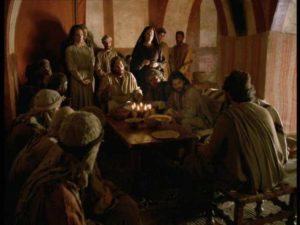From Galatians 1-3
Do Gentile Christians have to observe God’s commands in the law of Moses? Is it a sin for them not too? Are these commands the way you can tell who God’s people are or not? Is it right to stand in fellowship with someone who continually ignores God’s commands? Paul writes a stinging letter to the Galatians. They are in danger of going back to their practice of observing the Sabbath and festivals. Paul says this is out of step with the gospel.
This post is part of my bible in a year series.
Passage and Comments
Here is a link to my introduction on Galatians for a bigger summary of why Paul has written the letter and the concepts involved.
When Paul first went to Galatia he got sick. During this time he was looked after by a group of God-fearing Galatians who probably attended the synagogue and at that time were considering circumcision.
Paul shared the gospel with them and they came to believe in Jesus.
Paul told them they did not need to observe the law of Moses. In the gospel Gentiles who believed in Jesus were not instructed by Him to observe the law of Moses or be circumcised.
Some time later, Jewish Christians came to the Galatian church and instructed the Galatians to observe the Sabbath and various festival observances as commanded by God in the law of Moses.
Paul learned the Galatians returned to observing these practices. He is astonished and dictates this letter to get them to stop.
In the letter, Paul uses several arguments to help them to realize believers in Christ and especially Gentile believers are not required to observe the law of Moses. In this first argument Paul relates a previous incident he had with the apostle Peter at Antioch.

11 But when Cephas came to Antioch, I opposed him to his face, because he stood condemned. 12 For before certain men came from James, he was eating with the Gentiles; but when they came he drew back and separated himself, fearing the circumcision party. 13 And the rest of the Jews acted hypocritically along with him, so that even Barnabas was led astray by their hypocrisy. 14 But when I saw that their conduct was not in step with the truth of the gospel, I said to Cephas before them all, “If you, though a Jew, live like a Gentile and not like a Jew, how can you force the Gentiles to live like Jews?” (Gal 2:11–14)
A large amount of scholarly debate is devoted to working out whether this incident occurred before the Jerusalem council in Acts 15 or after. There is also some speculation who the men from James were.
Personally, other than working out how badly Peter (Cephas) stuffed up and what the men from James were doing, I can’t really see how the effort is worth it.
Normally, eating with Gentiles was unlawful (sinful) for Jews to do. But Peter some time earlier had a few visions from God that suggested Gentiles could be made clean in the eyes of God. At that time he shared the gospel with them and they received the Holy Spirit (Acts 10).
For these reasons when Peter was at Antioch he felt comfortable eating with the Gentile believers. In order to do this he had been relaxing various Jewish observances and accommodating himself to become more like the Gentiles. He did this in order to fellowship with them.
Eating at the same table was a big sign of fellowship and acceptance.
At some point Peter must have learned members a Christian group of Pharisees called the ‘circumcision group’ found out about what he was doing. Wanting to please them, he drew back and separated himself from the Gentile believers. This sets off a chain reaction among the Jews and other Jews follow his lead. The church is now divided, Jews and Gentiles.
Peter reversed his behavior, giving the impression what he did was wrong. He rebuilt what he tore down. That is, by his behaviour he implied it was wrong for Jews to fellowship with Gentile believers. Which is why the other Jews separated from the Gentile believers.
Importantly for Paul, the Gentiles now feel that they have to become Jews in order to fellowship with Peter and the other Jews.
In the gospel, there were several instances where Gentiles demonstrated faith in Jesus as their Lord and healer (e.g. Mt 8.10; 15.28; Lk 17.19).
Jesus never required them to become Jews or observe the law of Moses.
Jesus was called to the Jews (lost sheep of Israel) in order to fulfill God’s promises and bring in the Gentiles (Rom 15.8-9). When Gentiles approached him in faith he didn’t need to separate from them as Peter did at Antioch.
Whether Paul was there when Peter separated or he later came, the text doesn’t say. But when he realizes what has happened he knows it’s not in step with the gospel.
Paul opposes Peter to his face because it was a public mistake for him to separate from the Gentile believers. All the Jews who separated from the Gentiles made the mistake, but Peter instigated it. His behavior was out of step from what we see of Jesus in the gospel. Every one present needed to learn what was going wrong here.
It’s wrong to force Gentiles to live like Jews.
15 We ourselves are Jews by birth and not Gentile sinners;
16 yet we know that a person is not justified by works of the law but through faith in Jesus Christ,
so we also have believed in Christ Jesus, in order to be justified by faith in Christ and not by works of the law,
because by works of the law no one will be justified. (Gal 2:15–16)
Its unclear whether the following text is still part of Paul’s confrontation with Peter. Some think so. Either way the Gentiles in Galatia are meant to hear it.
Paul makes a distinction between Jews and Gentiles. Before Christ, Jews were considered the people of God – the righteous. From the Jewish point of view, Gentiles were sinners, they did not keep the law. Paul makes this distinction between Jew and Gentiles only to tear it down. They are all God’s people in Christ.
‘Works of law’. I have discussed this in my page on the New Perspective on Paul. These are commands in the law of Moses such as circumcision, Sabbath and festival observance, sacrifices, offerings and purification laws that require someone to do some sort of work.
‘Justified’. The verb is the same as James uses (dikaioutai, Gal 2.16=Gal 3.11=Jas 2.24). Paul has the same meaning.
Paul is speaking on behalf of Gentile believers who are already righteous in God’s sight.
They have already become righteous (C1 to C3; see the diagram below) through believing the gospel and through the atoning benefits of Jesus’ death on the cross (e.g. Rom 5.1,8-9; 1 Cor 6.11).
Paul is now speaking about how a person can tell they are righteous (C3) by whatever means. This is more appropriate for existing believers, such as the Gentile believers in Galatia.
‘A person is not identified as righteous by their circumcision, observing the Sabbath or festivals, through offering sacrifices at the temple or using water to ritually wash themselves clean, but by their belief that Jesus is the Christ’. For all Jewish and Gentile Christians, faith is the boundary marker for the people of God. It always has been.
‘By works of the law no one will be justified’. The saying echoes Ps 143.2 which says no one living is righteous before the Lord. Paul narrows its application however. Paul says, ‘by works of law no one will be justified’. Meaning, observance of circumcision, the Sabbath and festival, Levitical sacrifices, offerings and purification laws will never identify a person as righteous in God’s sight. This is a fairly big statement considering these were commands of God given in the law of Moses.

Martin Luther once wrote in his commentary on Galatians.
“The true way of becoming a Christian is to be justified by faith in Jesus Christ, and not by the works of the Law. We know that we must also teach good works, but they must be taught in their proper turn, when the discussion is concerning works and not the article of justification. Here the question arises, by what means are we justified? We answer with Paul, “By faith only in Christ are we pronounced righteous, and not by works.” Not that we reject good works. Far from it. But we will not allow ourselves to be removed from the anchorage of our salvation.”
Luther wrongly equates ‘works of law’ with good works. Paul is not talking about good works. He is talking about the works commanded by God in the law of Moses. He single-handedly placed an unhelpful stigma on good works to this day. Protestants today equate good works with something bad. Paul doesn’t do this.
Luther wrongly assumes ‘justified’ always refers to a sinner becoming righteous. This is the reason he misunderstood James. No ‘justified’ doesn’t mean just that in Paul’s thought. Here Paul is using ‘justified’ in the same way James does in Jas 2.24. He uses the same verb. Luther didn’t read much of the early church fathers. If he had, they would have set him straight.
Do you really think Paul would have criticised the Galatians if they were doing good works for others?
17 But if, in our endeavor to be justified in Christ, we too were found to be sinners, is Christ then a servant of sin? Certainly not!
18 For if I rebuild what I tore down, I prove myself to be a transgressor. (Gal 2:17-18)
Has Paul really gone the right way in following Jesus, believing in Him? If they were found to be sinners by ignoring the law of Moses then it shows the new way of life Jesus opened up was wrong all along and Jesus himself a servant of sin. The idea is abhorrent to Paul. Certainly not!
There is no going back for Paul. If he goes back and gives himself over to Judaism and instructs others to do the same then he shows that he was wrong in the first place to believe in Jesus and follow him.
This is the mistake Peter inadvertently made. At one point he was in fellowship with the Gentile believers, but then he turned away. His change of behaviour was perceived by others to mean what he was previously doing was wrong. i.e. ‘He rebuilt what he tore down’.

19 For through the law I died to the law, so that I might live to God. 20 I have been crucified with Christ. It is no longer I who live, but Christ who lives in me. And the life I now live in the flesh I live by faith in the Son of God, who loved me and gave himself for me. 21 I do not nullify the grace of God, for if righteousness were through the law, then Christ died for no purpose. (Gal 2:19–21)
What happens to the Christ happens to his people (2 Cor 5.14).
- When Christ was crucified so was Paul.
- When Christ was buried so was Paul.
- When Christ was raised to new life so was Paul.
Paul now lives and he lives by faith in Jesus.
Paul shares a little of his underlying feelings about what Jesus’ death means for him. Paul made a personal decision to turn away from the law. He did it because of the immense love Jesus showed him in giving up his life for him.
Paul rhetorically asks the what the value of Christ’s death would be if righteousness could come by the law of Moses. He highlights that Jesus’ death is the only way people can become righteous. The law of Moses could not defeat the power of sin (Rom 8.3-4).
Words for Believers

Most Christians today are Gentile believers. We have never really had Jews using the Old Testament scriptures to get us to observe various works of law. The early Gentile believers did.
Paul has done his work in getting us to recognise the people of God are those who believe Jesus is the Christ. That is what we confess as Christians.
If we were to see people eating kosher foods, observing the Jewish passover, the festivals of unleavened bread and booths or even offering an animal sacrifice we probably wouldn’t launch into this kind of argument as Paul did. I wonder if we as Gentiles would understand what was going on in the first place.
On the other hand, if we saw someone doing good works we probably wouldn’t use this kind of criticism on them either. Some Protestants in my experience have attacked those who encourage others to do good works or teach they are important. This is contrary to Paul’s practice (Gal 6.7-10; Tit 3.8,14; 2 Cor 5.9-10).
The passage helpfully points us towards the immense value of Christ’s death for us and our involvement in it. Righteousness is through the death of God’s son. Praise Jesus.
Copyright © Joshua Washington and thescripturesays, 2015. All Rights Reserved.


